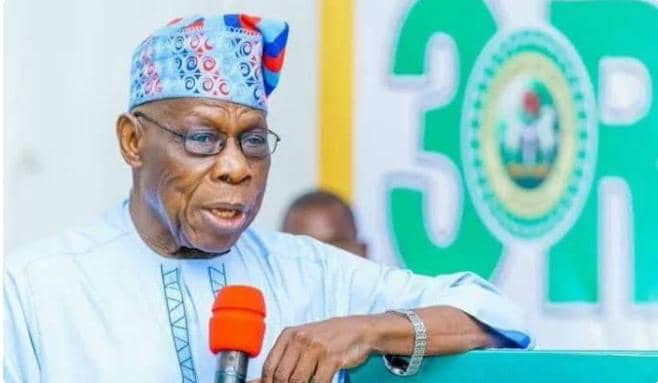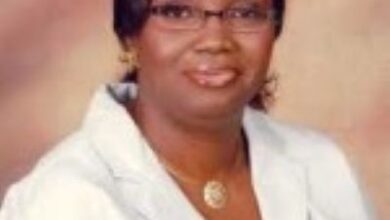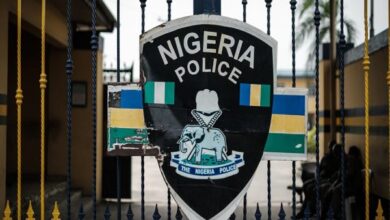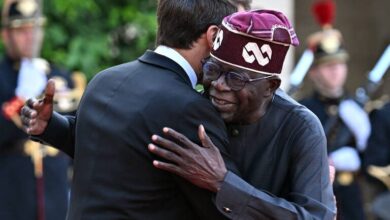Obasanjo explodes: third term plot was a myth, dares Nigerians to prove otherwise

(DDM) – Former President Olusegun Obasanjo has once again dismissed claims that he ever schemed for a third term in office, declaring that nobody alive or dead can prove such allegations.
Diaspora Digital Media (DDM) gathered that Obasanjo made the bold statement in Accra, Ghana, during the Democracy Dialogue organized by the Goodluck Jonathan Foundation, where he spoke to an audience of African leaders, scholars, and activists.
The former Nigerian leader said stories about a third term agenda had been recycled for too long, insisting that they were nothing but political fiction.
He challenged critics to provide concrete evidence, arguing that if he could successfully negotiate an $18 billion debt relief for Nigeria in 2005, engineering a constitutional amendment for another term would have been an easy feat.
Obasanjo told the gathering that extending his stay in power was never part of his ambition, stressing that leadership should never be about clinging to office.
He described the idea of being “indispensable” as a dangerous sin against God and a direct betrayal of democratic values.
The 87-year-old statesman emphasized that governance delivers its best results when driven by younger, energetic, and innovative leaders, rather than aged and frail rulers struggling to keep up with modern demands.
His intervention comes at a time when Africa is locked in intense debates over sit-tight leaders, term-limit manipulation, and constitutional amendments engineered by ruling elites.
The shadow of the third term debate
The third term controversy remains one of the most hotly contested parts of Obasanjo’s legacy.
Between 1999 and 2007, Obasanjo served two terms as Nigeria’s democratically elected president after the country returned to civil rule following decades of military dictatorship.
By the end of his second term, speculations emerged that some lawmakers and power brokers were pushing for a constitutional amendment to allow him another four years in office.
That speculation sparked national outrage, with civil society groups, opposition parties, and religious leaders staging protests against what they described as a looming dictatorship.
Despite repeated denials, many Nigerians still believe Obasanjo had knowledge of or benefited from the attempted constitutional review that would have created room for a third term.
The Senate eventually struck down the controversial amendment in May 2006, effectively burying the plan.
Obasanjo’s counter-argument
At the Ghana event, Obasanjo dismissed the story as a myth that refused to die.
He argued that his achievements in governance, particularly in securing debt relief and stabilizing the economy, showed that he was capable of achieving difficult tasks.
Therefore, if his true desire had been to remain in power, nothing would have stopped him from making it happen.
He dared his critics to provide a single Nigerian who could truthfully testify that he personally canvassed for tenure elongation.
According to him, the accusations were fabricated by political enemies who wanted to stain his democratic credentials.
Africa’s sit-tight syndrome
Analysts note that Obasanjo’s comments go beyond Nigeria, touching on a wider African problem.
From Uganda’s Yoweri Museveni to Rwanda’s Paul Kagame and Cameroon’s Paul Biya, several leaders have extended their rule through controversial constitutional amendments.
These extensions often lead to political instability, civil unrest, and erosion of democratic trust.
By distancing himself from such tendencies, Obasanjo positioned himself as an elder statesman calling for generational renewal.
He warned that leaders who see themselves as irreplaceable endanger not only their countries but the future of democracy itself.
A legacy still under debate
For many Nigerians, Obasanjo’s record remains mixed.
Supporters credit him with laying foundations for Nigeria’s economic reforms, tackling foreign debt, and strengthening regional peace efforts.
Critics, however, accuse him of authoritarian tendencies, political interference, and an overbearing leadership style that still influences Nigerian politics long after he left office.
The third term saga remains a central flashpoint in that debate, often resurfacing whenever discussions about term limits or leadership succession arise in Africa.
The Jonathan Foundation dialogue
The Democracy Dialogue where Obasanjo spoke was part of a broader initiative by former President Goodluck Jonathan’s foundation to promote democracy, good governance, and peaceful political transitions across Africa.
The event attracted a mix of political leaders, intellectuals, and civil society actors seeking solutions to the continent’s leadership challenges.
By using the platform to clear his name, Obasanjo reignited one of Nigeria’s most enduring political conversations.
Observers say his remarks will once again stir debates across the country, with some welcoming his defense while others remain unconvinced.
What remains clear is that the shadow of the third term will continue to haunt his legacy, whether he admits it or not.
Post Views: 17





